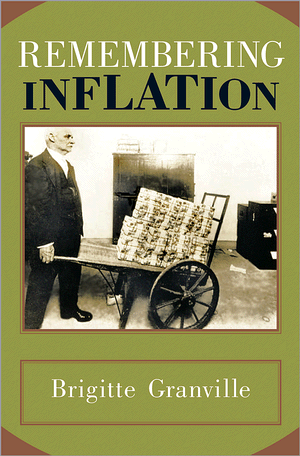
In this book, Brigitte Granville makes the case that monetary economists and policymakers need to keep very much in mind the lessons learned during the Great Inflation of the 1970s, lest we return to make the same mistakes. Tackling fundamental questions such as the causes of inflation and its relation to unemployment and growth, the natural rate of inflation hypothesis, the fiscal theory of the price level, and the proper goals of central banks, the book aims above all to demonstrate the dangers of forgetting the role of credibility in establishing sound monetary policy. Ramin Nassehi finds this book will be beneficial for any economist who follows the current heated debates about inflation.
 Remembering Inflation. Brigitte Granville. Princeton University Press. July 2013.
Remembering Inflation. Brigitte Granville. Princeton University Press. July 2013.
Since the outbreak of the global financial crisis, many academics have argued that economics needs to take history more seriously. Brigitte Granville’s latest book Remembering Inflation represents a step in this direction, with the author reviewing the history of thought on inflation and offering important lessons for today. As its name suggests, the book urges us not to forget the threat of inflation in the mist of the current crisis.
Ironically, this book has been published at a time when central bankers in the US, the UK, and the EU are injecting unprecedented amounts of money into their economies in an attempt to lower long-term interest rates and provide liquidity to the financial sector, with very little concern about inflation. Quite the contrary, due to the high levels of debt and the possible threat of deflation in these economies, the policymakers now welcome a steady inflation rate to facilitate the process of deleveraging through eroding the real value of their debt. However, Granville warns that this temptation to inflate the debt away in rich countries can loosen the central banks’ grip over inflationary expectations and erode their credibility. She reminds us that this credibility has been earned in a long and painful historical process.
Granville’s book provides a comprehensive review of theoretical and empirical research conducted on monetary policy and covers a wide range of topics that are indirectly linked to this subject, such as globalisation and financial stability. The bibliography, which runs for more than thirty pages, is indicative of the book’s comprehensive approach.
The book starts with the evolution of thinking on inflation, telling the well-known story of paradigm shifts in economic thinking in the 20th century: from the rise of Keynesianism in the 1930s to the monetarist revolution of the 1970s. Then, it explores the theoretical debates regarding the origins of inflation. According to Granville, the main cause of inflation is chronic budget deficit as governments normally get tempted to print money to finance their deficits under severe fiscal constraints. This argument, which is rooted in the “fiscal theory of price level”, forms the core thesis of the book and the author refers to it in every chapter. It claims that fiscal policy can possibly affect price stability by shaping the inflationary expectations of agents regarding the future prospect of debt monetisation. Therefore, to control inflation, monetary policy should be coordinated with fiscal policy. In this line, Granville argues that having a credible central bank that follows price stability is a necessary, but not a sufficient, factor for controlling inflation.
The author then applies this theory to the US economy and warns about the Fed’s future credibility in anchoring expectations, given the chronic fiscal deficit of the government. She suggests that any strategy for inflating the debt should be made explicit by the Fed, otherwise, this institution might erode its credibility and loosen its control over expectations.

The main body of the book deals with the factors that have helped central banks in the past two decades to gain credibility, which is appraised as their most precious asset. Central banks’ independence is usually highlighted as a crucial factor for building this credibility, but the author finds inconclusive evidence for this factor. She stresses that this legal arrangement is effective only when it is supported by a long-term political commitment towards fighting inflation. She emphasises the adoption of “rule following” in the form of nominal targeting as a more important factor in building the central banks’ credibility. Inflation targeting, first pioneered by New Zealand and Canada in the 1990s, is introduced as the most effective nominal anchor for ensuring price stability.
The book continues with the most important political economy question regarding price stability: who benefits from low inflation? Granville’s short answer is the poor. She conceptualises inflation as a regressive tax that redistributes income from those who cannot hedge against price instability – namely the poor – to those who can. In addition to this adverse distributional implication, she highlights that inflation impedes growth by discouraging investment through fuelling macroeconomic instability.
Finally, the book discusses monetary policymaking in the age of globalisation. In summary, Granville does not think that globalisation has decreased (or increased) the policy space for central bankers in rich or developing countries; for example, she finds no evidence that trade liberalisation or capital account liberalisation has hindered (or helped) domestic monetary policymaking in any respect. On the contrary, she traces the root cause of many problems associated with globalization – particularly the large imbalance between creditor and borrower countries – to domestic policies. In fact, she blames the mercantilist policies of surplus countries like China for creating such global imbalances.
However, the book does not address the challenges that financial globalization – especially capital account liberalisation – entails for domestic policymaking in developing countries. For instance, many emerging economies are currently trapped in a policy dilemma due to the large short-term capital inflows that the Fed’s QE has triggered: they either have to reduce their interest rates to discourage inflows, or leave their rates intact and sterilise the monetary impact of inflows. The first option leads to overheating of the economy (or large nominal exchange rate swings), while the second option continues to keep the host economy attractive for “hot” capital inflows. This can be seen as an example of how capital market liberalisation can limit the policy space in emerging economies.
Overall, Granville’s book is a staggering intellectual achievement; she offers a rich analysis of theoretical and empirical research conducted on inflation, mapping out the historical development of economic thought on this important topic. Of course, many economists may disagree with the lessons for today, especially regarding the dangers of the unprecedented monetary easing that is taking place in the US and the UK at the moment. Nonetheless, this book can be beneficial for any economist who follows the current heated debates about inflation with great interest.
———————————————–
Ramin Nassehi is a Teaching Fellow at the Department of Economics at SOAS. He is conducting his PhD on the role that oil played in the process of state-led industrialisation in pre-Revolutionary Iran. Ramin holds a BSc in Business Management from Queen Mary, an MSc in Development Management from LSE, and an MPhil in Development Studies from the University of Oxford. Read more reviews by Ramin.








1 Comments